Marie Skłodowska-Curie Action Staff Echange - EVOLVE
Project description
Recent developments in the Electric Vehicles (EV) technologies have made great strides to offer new modes of smart green urban mobility, where EVs are used as the main transportation mode replacing the conventional diesel and petrol powered vehicles. EVs are expected to play a key role in achieving ambitious targets of lowering greenhouse emission in the transportation sector. Given the EV penetration rates and future forecasts, it is essential to develop technologies that tackle charging management of EVs considering a holistic view of charging supply/delivery management for EVs, communication of EVs to the smart grid infrastructure system using 5G and beyond systems, smart grids and big data analytics for EVs optimise smart mobility and enhance the quality of experience for EV users. EVOLVE aims to exploit the scientific excellence and expertise of key academic and industrial players into a joint collaborative effort to design, develop and test various technologies that consider the holistic view of EV charging taking into account the view of technical and business stakeholders. EVOLVE will pursue innovation for advancing the technologies in EV charging ecosystem by orchestrating and managing the underlying networking and computational resources, design innovative algorithms using Artificial Intelligence (AI) and Machine Learning ML), developing communication protocols, prediction and optimising load in smart grids, developing software systems and user interfaces (UIs). EVOLVE aims to transcend analytical models and simulation-based validation and aims to deliver five proof-of-concept (PoC) demonstrations. EVOLVE project will provide a platform to foster a close collaboration between academia and industry partners providing each with a unique experience to create new knowledge, share know-how and skills development.
Objectives
These are the objectives of EVOLVE:
- Objective 1: To develop a new framework that enables unified communication and processing capabilities for both EV charging management systems and vehicular communication.
- Objective 2: To develop software services that can be exploited across the application stack. Development of ML/AI capabilities that are employed for EV charging management application as well for self-optimization of resources.
- Objective 3: To ensure scalability of proposed framework whereby application resources and execution across the edge-fog-cloud is autonomously and optimally executed. Provisioning containerized self-scaling software capabilities.
- Objective 4: To incorporate dynamics of all three networks, i.e., power, communications, and vehicular networks through integrated data layer with appropriate scheduling of flows over wireless networks.
Role of Ghent University
Ghent University is the lead of WP4 “Integration of EV with beyond 5G infrastructure and smart grid”
Ghent University is involved in the following tasks:
- Task 4.1 - Investigating seamless vehicular-to-everything (V2X) connectivity in multi-Tier and multi-RAT networks
- Task 4.2 - Enabling distributed intelligence in V2X communications through edge computing and on-device learning
- Task 6.3: Task 6.3: Demonstration of a federated learning solution for technology recognition in V2X
Website
Contact
Prof. Ingrid Moerman, seconded Dr. Adnan Shahid
Department of Information Technology
Phone number: +32 9 331 49 26
E-mail: Ingrid.moerman@ugent.be, adnan.shahid@ugent.be
Funding info
Disclaimer
Funded by the European Union. Views and opinions expressed are however those of the author(s) only and do not necessarily reflect those of the European Union or the European Research Executive Agency (REA). Neither the European Union nor the authority can be held responsible for them.


